- About Us
- Policy Center
- Learn
- Press Room
- Blog
- Get Involved
- Donate
- Donate to J Street Online
- Make a Gift in Someone’s Honor or Memory
- Make a Monthly Gift
- Tax-Deductible Donations
- Giving by mail
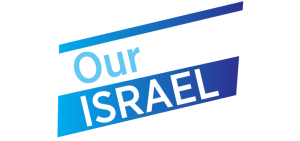
J Street is proud to stand with pro-peace Israeli organizations who do amazing work to create a better future for Israelis and Palestinians.
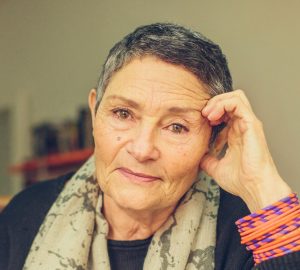
Robi Damelin remembers exactly what she told the Israeli Defence Forces when they delivered the news that her son, David, had been killed serving in the West Bank.
“You may not kill anybody in the name of my child,” she said bluntly, an instinctive response which would go on to define her life’s work from that moment onward.
David had been a gifted musician. Deeply empathetic. Active in the peace movement. Indeed, when he was offered the chance to postpone his post-university reserve duty, it came as somewhat of a surprise to Damelin that he turned the postponement down. “People see soldiers without having the faintest idea about the person behind that gun,” she tells J Street.
It might have been a decision he soon regretted. After marching in opposition to the occupation and the ongoing conflict, he was deeply conflicted when he learned he would be posted to service in the occupied territories. “It was a terrible quandary for him,” Damelin says. “If you want to go to jail I’ll support you,” she remembers telling him, willing him to take a safer path.
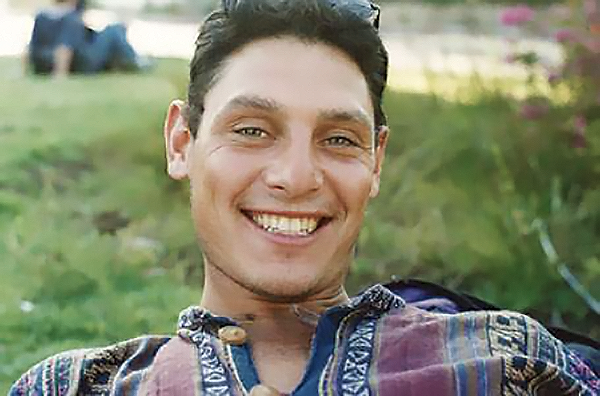
Robi Damelin’s son David was killed at a checkpoint in 2002.
Ultimately, he decided to go, weighed down by a sense of commitment to his fellow soldiers and reasoning that it was better for him to be there in place of someone who hadn’t wrestled with the injustice of the occupation. “If I go I’ll treat people with dignity,” he told his mother, “and so will my soldiers.”
That was how Robi Damelin’s son ended up at a roadblock near Ofra one Sunday morning, stopping vehicles on the road from Ramallah to Nablus. “We’re sitting ducks,” he told her in a phone call the day before.
At around 6:30 am, shots rang out and three soldiers at the checkpoint dropped to the ground, shot by a Palestinian sniper. David rushed to help, only to be shot himself. In minutes, the sniper killed ten soldiers and civilians, wounding four others, before escaping from the scene unharmed.
“It was a crazy checkpoint that they never should have had in the first place,” Damelin says with anger. “They removed it a day or so later and never reestablished it, and what does that tell you? It was a purely political checkpoint.”
Damelin ended up quitting her job, traveling to India and struggling to make sense of a life that suddenly seemed smaller and less consequential. It was a struggle that led her to The Parents Circle – Families Forum (PCFF), a group that unites bereaved Israeli and Palestinian families to advocate for peace, reconciliation and an end to the cycle of violence. For the past 16 years, she’s been dedicated to the work. “We’re the only advocacy group to say we don’t want any new members,” Damelin says.
The Parents Circle – Families Forum was founded in 1995 by Yitzhak Frankenthal following a parallel story of pain and loss — a year earlier, Frankenthal’s 19-year-old son Arik had been killed by Hamas.
It was a loss that drove Frankenthal, an Orthodox Jew, to spend three months ensconced in a Tel Avivi library, rooting through old newspapers to find the names and families of all Israelis killed by terror attacks since the country’s founding in 1948.
Frankenthal sent more than 300 letters out to the families, inviting them to join a group of bereaved Israelis and Palestinians he hoped to establish. From the 44 Israeli families who initially responded, the group has now grown to over 600 Israeli and Palestinian families — united together in pain, grief and a shared commitment to a better path forward.
Much of the organization’s outward work today focuses on direct, personal reconciliation experiences. Dialogue encounters held in schools and other settings introduce audiences to one Palestinian and one Israeli who each tell their stories of grief and loss. The group also runs parallel narrative experiences, bringing together Israelis and Palestinians who share similar backgrounds — from grandmothers to activists, doctors to students, psychologists to teachers.
For Damelin, the group’s work with schools is particularly important. “It’s probably the first time in their lives they’ve ever met a Palestinian,” she says, noting her concern that younger Israelis are drifting further and further to the right. “They get fed fear,” she says. “But even the hardest of hearts finds it difficult not to have some empathy when they’re faced with someone speaking about loss right in front of them – I’m not saying they become Gandhi, but it does give them a small glimmer of empathy, and sometimes even more so.”
Faced with a deepening chasm between two peoples living just miles away from each other, it’s work which is more urgent than ever. It’s also work which had been supported by the United States, up until President Trump cut funding for all coexistence projects. “It meant, for us, a 30% cut to our total budget,” Damelin says, “in the middle, almost overnight, our budget was cut off.”
The Biden administration is now working on restoring congressionally appropriated funding for such projects but continues to face obstacles from right-wing forces in Congress.
For The Parents Circle – Families Forum, the most high-profile day of the year is Israel’s Memorial Day, when the group joins with Combatants for Peace to hold a joint vigil between Israelis and Palestinians to remember those lost to the conflict. From what started out as a side-project, it’s an event that has grown to become Israel’s second-largest memorial gathering, attracting roughly 200,000 participants — and controversy and condemnation from the right.
“Every year it got bigger and bigger,” Damelin says, “it got more and more difficult to find halls,” Event spaces and performers would often decline, fearing they’d face boycotts for supporting an event which raises up the toll the conflict has taken on Palestinians as well. “It’s not a political gathering,” Damelin says, “it’s to understand the pain of the other.”
Still, that hasn’t stopped the controversy. In 2019, the group had to go to the High Court to overturn a Defence Ministry ban on Palestinians entering Israel for the service. The same year, several dozen protestors yelled “traitors,” “kapos” and “Nazis” at participants. “This is the Memorial Day for fallen IDF soldiers, not terrorists, hopefully God will take you — you leftists, dirty leftists,” one protestor shouted.
When the group started out, they focused on in-person meetings with bereaved parents from Gaza and Israel, including one session hosted by Israeli President Ezer Weizman. “It was quite an extraordinary gesture for the president to invite Palestinians to his home for a meeting at the time,” Damelin says.
But following the collapse of the peace process in 2000 and the second intifada, violence, conflict and increasing barriers between Israelis and the Palestinians forced the PCFF to innovate. “We all became very much cut off,” Damelin says.
In 2002, the families traveled to the United Nations, laying more than 1,000 coffins draped in Israeli and Palestinian flags in New York’s Dag Hammarskjold Plaza. “I want to send a message for all of the leaders to help us to bring them to sit around the table and to start negotiating,” said Ibrahim Bushnak, a Palestinian PCFF leader who lost his nephew in the conflict. “Stop shooting and start talking.”
The same year, the group launched the “Hello Shalom, Hello Salaam” hotline, providing a toll-free number the public could use to reach an operator who would connect Israelis with Palestinians at random and vice versa. “The idea happened by chance — a woman dialed the wrong number and she got a Palestinian in Gaza and then they got into a whole conversation,” Damelin says. “People weren’t calling to say ‘hello darling let’s make peace,’ there were a lot of tough conversations on that line, but a lot of friendships built as well.”
In a demonstration of the system for the Baltimore Sun, Frankenthal called the hotline himself and was quickly connected with a Palestinian man in Ramallah, who he spoke to for half an hour. “He told me he had lost his sister, and I told him about my son,” Frankenthal said. “And he said, ‘Here we are talking. I don’t want revenge, and I don’t feel hatred.’”
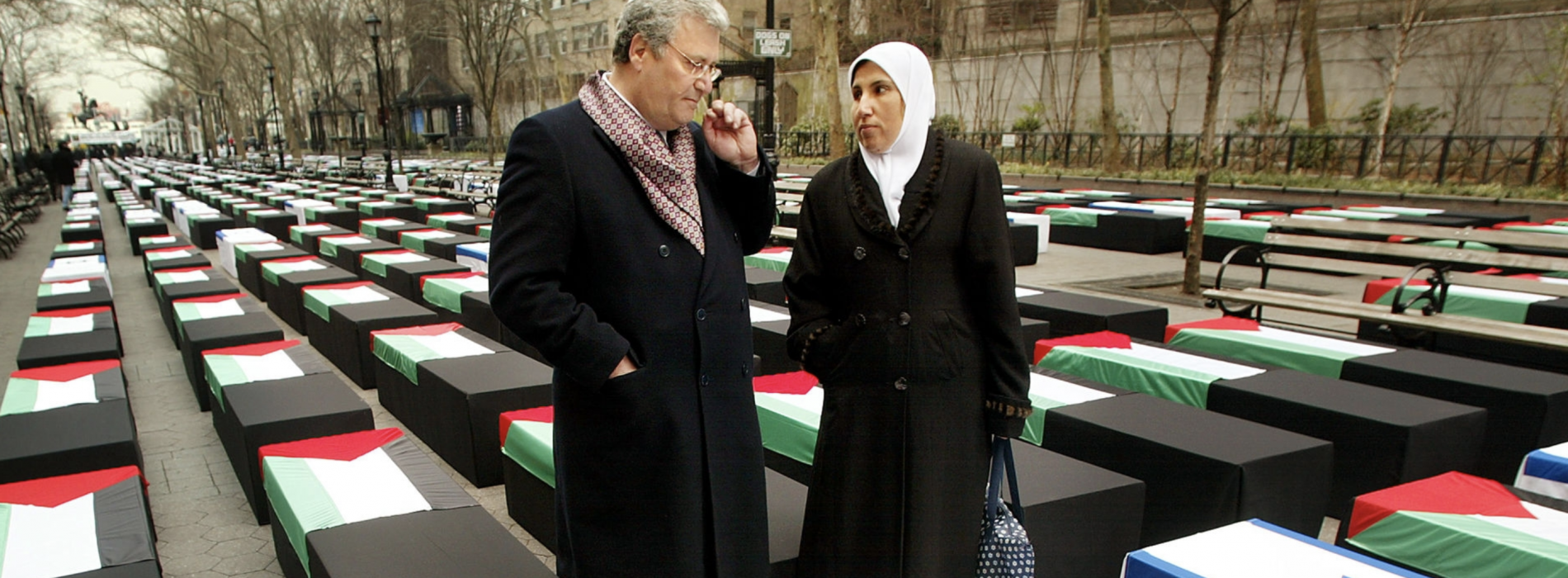
It was Frankenthal who reached out to Damelin as well, inviting her to join a group for a meeting following her son’s death. “I looked into the eyes of the Palestinian mothers, and I realized that we shared the same pain,” Damelin says, “and I also realised we could be such an amazing force standing together.”
As peace advocates who have suffered such immense personal tragedy, the group holds a widely-respected position in Israeli society — a position that has endured through the collapse of the Israeli peace movement and a sharp uptick in political partisanship, Damelin says. “It’s a deeply personal message coming from us, it’s not political bullshit.”
Ultimately, the long-term goal of the organization is to create and maintain a reconciliation framework that can help build toward a peace agreement, and continue to bring both sides together thereafter. For Damelin, it’s a project with special resonance, having immigrated to Israel from South Africa, a country that was grappling with the intolerable injustice of apartheid when she left.
“There has been an apartheid situation here but I never used the word,” Damelin tells J Street, “but if they go through with annexation and if 3 million people are suddenly under our rule, then I think it’s an apartheid state, and that terrifies me.”
For Damelin, who returned to South Africa to make a film about the reconciliation process, the country can be thought of as a case study for two people reconciling a violent past, she says, noting that Israel is far from the only nation challenged with resolving a conflict which may take decades, or even centuries, to truly reckon with. Australia’s ongoing work of reconciliation with the country’s first nations people is another example, she notes, as is the urgent moment of racial reckoning facing America after the death of George Floyd in 2020.
For her, reckoning with the inherent injustice of the occupation is about building a better Israel. “Occupation for so many years, it’s affecting the moral fiber of this country.”
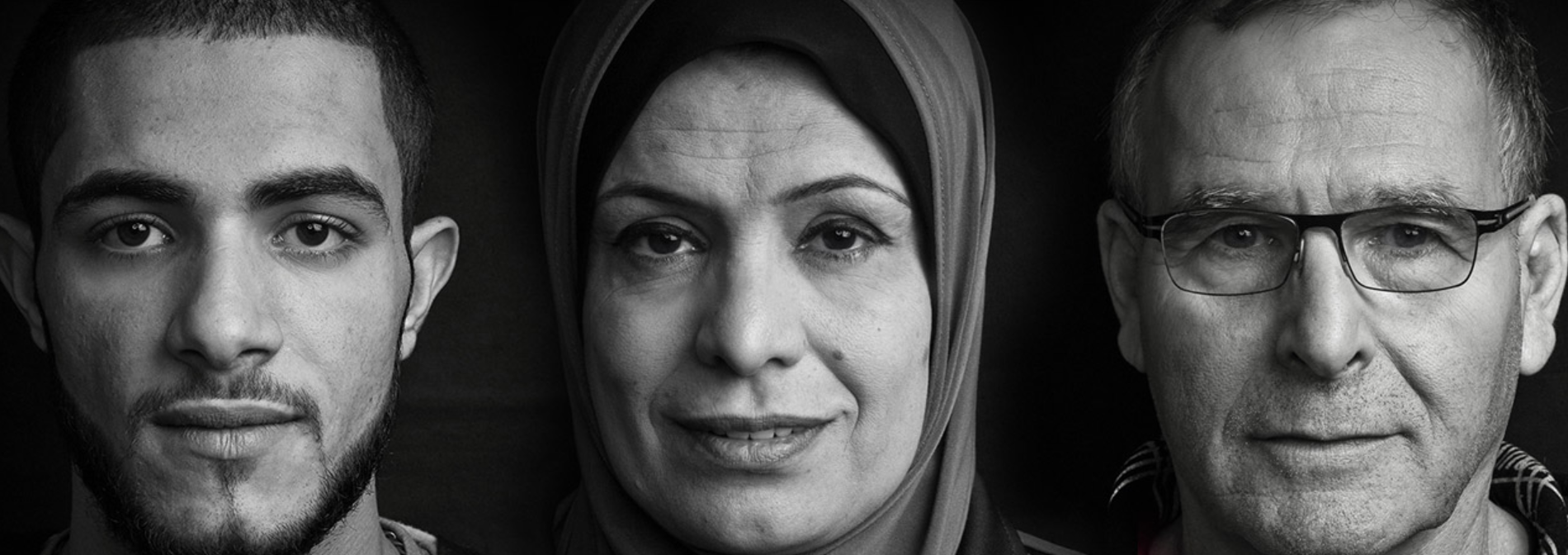
As Damelin speaks about reconciliation, she recalls a particularly powerful moment during one of the group’s joint group trips in Israel. A Palestinian woman — walking the streets of a hometown she would never be able to return to live in — stopped by a well she suddenly recognized, describing to the group how she had drawn water from it as a child.
“It doesn’t mean you can fix the original injustice, but it does mean that you’ll understand the pain of that woman, and why she walks around with a key to a door that will never open again,” Damelin says, recalling how moments like this still make an impact on her. “We may understand each other because we feel the same pain, but we don’t necessarily understand how each side sees themselves — their national histories and milestones.”
That commitment to parallel narratives and to true equality and respect is carried through in how the PCFF is run. The organization has two co-directors, one Israeli, one Palestinian, and operates from two parallel, fully staffed headquarters, one near Tel Aviv and the other in Beit Jala on the West Bank. “Having two offices is very important, because it gives us a way — in a very unequal situation — to try and not be patronizing,” Damelin says. “It’s worth everything.”
Healing can be a painful process, an experience Damelin is all too familiar with. Three year’s after David’s death, several soldiers arrived at Damelin’s door to tell her they’d caught David’s killer. “They thought I would be delighted, but I wasn’t at all,” she said. Instead, the news prompted months of sleepless nights. “You can talk about peace and love and reconciliation, putting it into practice is another thing.”
Eventually, she resolved to send the family a letter expressing her sense of loss and her hope for eventual peace. Two and a half years later, she received an angry response from the sniper himself — stay away from my family, I killed those people to free Palestine. She also learned that her son’s killer had seen his uncle killed violently by Israeli soldiers and had lost other relatives in the second Intifada.
Although Damelin was initially shaken by the response, today she finds herself more at peace. “You don’t have to live in the past, but you do have to deal with it,” she says. Years later and the sniper, now in prison, has agreed to eventually meet her face to face. It’s something Damelin wants to go forward with, but she’s not in a rush.
“There’s no such thing as instant reconciliation, it’s something that doesn’t happen overnight, and it may not happen at all,” she says. “But for those of us in this forum who understand the true consequences of this violence, we don’t have the luxury of giving up.”
In May 2020, J Street welcomed PCFF co-directors Bassam Aramin and Rami Elhanan to a conversation on J Stream, our online event program for the pro-Israel, pro-peace, pro-democracy community. Both Bessam and Rami have lost daughters to the conflict.